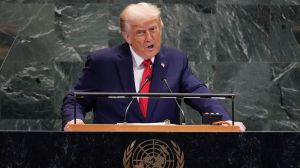Stirrings in the sand
Keep your eye on Egypt, which is stirring politically after a generation of political dormancy. The implications for the entire Arab world c...

Keep your eye on Egypt, which is stirring politically after a generation of political dormancy. The implications for the entire Arab world could be significant, because Egypt’s political and cultural life has always set an example for others in the region. In the past several months, various sectors of Egyptian society have engaged in more public forms of political protest and activism, reflecting a significant revival of Egypt’s traditional role as a fountainhead of Arab civil society and political culture.
The signs are important…The kefaya (“enough”) movement launched last year has organised modest, peaceful street demonstrations of hundreds of people demanding that President Hosni Mubarak not run for a fifth term this autumn, arguing that his four terms and 24 years in office are “enough.” The movement also wants to block the possible presidential succession of his son Gamal, who has assumed a pivotal political post in the ruling National Democratic Party….The Muslim Brotherhood, the banned party that probably has the widest support at the grassroots level, has started holding peaceful protests, also demanding democratic reforms and an end to the emergency laws. Protesters in the last few weeks have included thousands of students at several universities, and smaller street demonstrations that resulted in the security forces arresting hundreds of people in towns like Mansura, Zagazig and Fayyum. The government said 400 members of the Muslim Brotherhood had been arrested, while the party itself charged that over 1,500 were detained, including some of its leaders.
More significant has been the new assertiveness of some members of the Egyptian judiciary, long respected for its independence and professionalism in the Arab world…In Alexandria last month, 1,200 judges issued a public demand for judicial independence, and coupled this with a threat that they would not certify the presidential election in the autumn if their demands were not met…
These are profoundly important developments, together signifying a new dynamism and political energy in a country that has been perplexingly dormant and acquiescent in recent decades. The president has already responded in part by promising a multi-candidate presidential election this year. Opposition groups, however, decry the conditions placed on other candidates as unfair, charging that Mubarak will predictably win because his most credible opponents will not be allowed to run…
Excerpted from Rami G. Khouri’s piece in Beirut’s ‘The Daily Star’
Photos



- 01
- 02
- 03
- 04
- 05




























